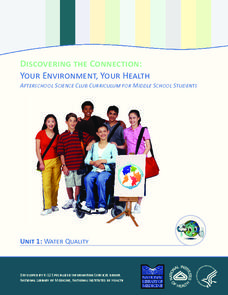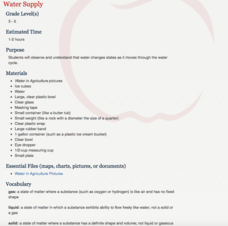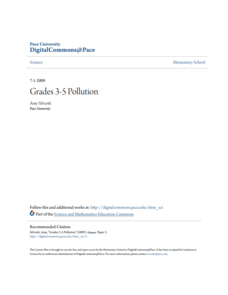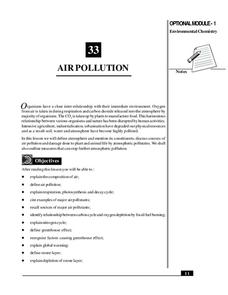Safe Drinking Water Foundation
Make Your Own Water Pollution
Using the polluted water that was made in the prior lesson, your young environmentalists will mix pollutants together in an experiment. Then, they will design a water filter that will clean the polluted water to use in the next lesson....
Safe Drinking Water Foundation
How Water Pollution Is Cleaned Up
As a follow-up from the previous instructional activity, young environmentalists discuss the benefits of water filtration and whether or not it's the best option. Other alternatives including air stripping, bioremediation, and...
DiscoverE
Water Pollution Cleanup
How do scientists determine the best method for removing pollutants from our water sources? Environmental scholars experiment with pollution clean-up options to discover which are the most cost-effective, fastest, and most thorough....
Marine Institute
Water Pollution
Sixth graders investigate the various types of pollutants found in water and ways to help prevent water pollution. Through a hands-on experiment, students create samples of polluted water by mixing water with vegetable oil, dirt, and...
Curated OER
Who Polluted the River?
Study the impact of water pollution. A hands-on experiment and an interactive story about water pollution are the basis for the learning experience.
National Library of Medicine
Your Environment, Your Health: Water Quality
How important is water quality where you live? The first module in a six-unit series includes four lessons on water quality. By applying the concept directly to the lives of pupils, they engage in meaningful learning. They read about...
US Environmental Protection Agency
Non-Point Source Pollution
Investigate the different types of pollution that storm drain runoff carries into oceans, lakes, rivers, and streams with this class demonstration. Using an aquarium and an assortment of everyday items that contaminants like motor oil,...
Kenan Fellows
Sustainability: Learning for a Lifetime – The Importance of Water
Water is essential for life—and understanding the importance of clean drinking water is essential in understanding sustainability! Show your environmental science class the basics of water testing and treatment through a week-long...
Safe Drinking Water Foundation
To Filter or Not to Filter
Drinking clean water can be taken for granted. Explore the process and high cost of filtering water with a water pollution and filtration activity. Young scientist build a filtration system to filter polluted water, examine the economics...
NASA
The Case of the Wacky Water Cycle
Join the tree house detectives in learning about the processes of the water cycle, water conservation, water treatment, and water as a limited resource.
National Institute of Food and Agriculture
Water Supply
Participate in three activities that look at the earth's limited water supply and the changes water goes through as it enters each phase of the water cycle. The resource is complete with three activities that demonstrate the changing...
SRI International
The Water Crisis
Water, water, everywhere, right? Wrong. Learners assess their own knowledge of water availability on Earth. Then, through a reading, a teacher-led presentation, and an activity, pupils learn about the importance of available clean...
Safe Drinking Water Foundation
Water Bottles Everywhere
Young environmentalists examine how water bottle use is polluting the waters on our earth. In groups, your young scholars study the handout on their assigned topic and present their findings to the rest of the class. Leading up to this...
Pace University
Pollution
Over the course of 10 days, scholars take a pre-assessment to place them in one of three leveled groups. Whole-class and in small groups, pupils take part in read-alouds, field trips, hands-on activities, and complete learning contracts...
Safe Drinking Water Foundation
Making a Difference
After learning about the effects of water pollution, your class will discuss ways to make people in their community aware of the importance of water conservation. Then, your young environmentalists will write a letter to the local...
Wilderness Classroom
Pollution
Educate scholars on pollution—air, water, and land—with a series of lessons that begin with a thorough explanation of each type. Learners then take part in three activities to reinforce the importance of reducing pollution. They...
US Environmental Protection Agency
Aquifer in a Cup
Young scientists create their very own aquifers in this science lesson on ground water. After learning about how some people get their drinking water from underground wells, young learners use sand, modeling clay, and aquarium rocks to...
US Environmental Protection Agency
A Mock Town Meeting on a Proposed Tank Farm
Intended as a follow up to the Protecting Your Drinking Water activity, young environmentalists use their assessment of the a hypothetical town's water supply to debate the installation of underground chemical storage tanks. With the...
Curated OER
Snapshot Day Definitions and Activities
Here is a document full of teaching notes on water quality and bodies of water that you can use in your ecology curriculum. It has information specific to the Hudson River area, but can easily be adapted to any local body of water....
May Media Group
Treatment Plants
Young scientists explore nature's water treatment plants in this simple science demonstration. By placing a stalk of celery in a cup of water mixed with food coloring, children are able to observe how plants absorb nutrients and...
National Institute of Open Schooling
Air Pollution
Seventy percent of the air pollution in China is due to car exhaust. Under the umbrella of environmental chemistry, learners extensively explore air pollution. From the makeup of our atmosphere to sources of major air pollutants, classes...
Curated OER
Water Pollution Experiments
Fifth graders conduct experiments in simulated water pollution using a box of items to hold "pollutants"and an aquarium, representing a waterway. They observe how "rain" from a watering can poured into the box washes the pollutants into...
Environmental Protection Agency (EPA)
The Case of the Mysterious Renters
Upper-elementary kids examine the water usage in their own home, then use that data to solve a case in which a landlady is trying to determine how many people are living in an apartment being rented. Combine math, scientific method, and...
National Park Service
Glaciers and Water
Explore the amazing power of glaciers with a hands-on earth science experiment! After first learning basic background information, learners go on to create their very own chunks of frozen water and gravel in order to observe first-hand...

























